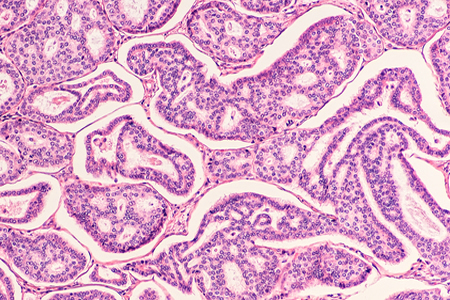Research conducted in the UK and Spain suggests the diphenylbutylpiperidine class anti-psychotic drug Pimozide could potentially be used as a new treatment for triple-negative breast cancer after it was shown to reduce both the size and number of tumors in mice. In addition to halting growth of the tumors, it was also shown to stop breast cancer tumors from metastasizing and spreading to the lungs.
The research was a collaborative effort by researchers at the University of Bradford, Queen’s University in Belfast, and the University of Salamanca in Spain. The team, headed by University of Bradford professor of molecular pathology and cancer therapeutics, Mohamed El-Tanani, Ph.D., has also suggested possible mechanisms involved in the inhibition of cancer.
Pimozide selectively blocks the dopamine receptor D2 (DRD2) and is used in the treatment of schizophrenia and other psychotic disorders. Due to the relatively lower incidence of cancer in patients with schizophrenia than the general population, it had previously been suggested that anti-psychotic drugs may play a role in lowering the relative risk of cancer.
Previous research by the team confirmed that was likely the case. The team had previously demonstrated that the protein Ran-GTPase (Ran) played a role in the grown and spread of cancers, including triple-negative breast cancer and they conducted a search for molecules that were capable of suppressing Ran. Pimozide was identified as a prime candidate and was shown to block Ran expression at the mRNA and protein level by up to 87% and also blocked the AKT signaling pathway, which also plays a role in the development of tumors.
The team showed that Pimozide suppressed the growth of breast cancer cells in vitro, but this is the first time that the inhibitory effects of the drug have been demonstrated in vivo. The research also suggests the drug could potentially be used as a novel treatment for lung cancer.
Triple-negative breast cancer is the hardest form of breast cancer to treat. It has lower survival rates than other forms of breast cancer and a high rate of recurrence. There are currently only limited targeted treatments that are available. “Our research has shown that Pimozide could potentially fill this gap. And because this drug is already in clinical use, it could move quickly into clinical trials,” said El-Tanani.
The research is detailed in the paper – The anti-psychotic drug Pimozide is a novel chemotherapeutic for breast cancer – which was recently published in the journal Oncotarget: doi.org/10.18632/oncotarget.26175
